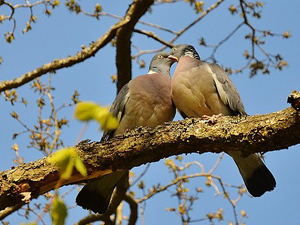It seems probable that proposals for the marriage of King Richard II to Anne of Bohemia are glanced at, and the Elizabethan poet, John Donne, uses the same theme in his Epithalamium (or Marriage Song) upon the occasion of the wedding of the Princess Elizabeth to Frederick Count Palatine of the Rhine – a marriage which gave our present royal family to the throne, and which took place on St Valentine’s Day 1613:
Hail Bishop Valentine! whose day this is;
All the air is thy diocese,
And all the chirping choristers,
And other birds, are thy parishioners;
Thou marriest every year
The lyric lark, and the grave whispering dove;
The sparrow that neglects his life for love,
The household bird with the red stomacher;
Thou mak’st the blackbird speed as soon
As doth the goldfinch or the halcyon –
This day more cheerfully than ever shine,
This day which might inflame thyself,
Old Valentine!
All the air is thy diocese,
And all the chirping choristers,
And other birds, are thy parishioners;
Thou marriest every year
The lyric lark, and the grave whispering dove;
The sparrow that neglects his life for love,
The household bird with the red stomacher;
Thou mak’st the blackbird speed as soon
As doth the goldfinch or the halcyon –
This day more cheerfully than ever shine,
This day which might inflame thyself,
Old Valentine!
But February ( or Sprout-Kale,)as our Saxon ancestors called it,) is not all birdsong and sunshine: its frequently excessive moisture is what makes the kale sprout; as the
folk couplet runs:
folk couplet runs:
February fill the dyke
Either with the black or white.
– that is with water or snow – where assonance, dyke / white, replaces rhyme as a certificate of the verse’s antiquity.
Next: The Fairie Queene Edmund Spenser
